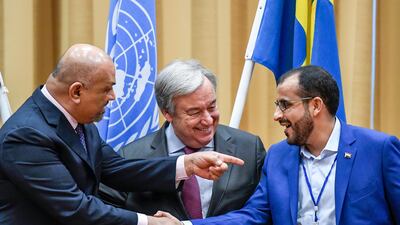Eight days of negotiations in the tiny Swedish town of Rimbo have brought us to this moment. The agreement among Yemen’s warring parties on a ceasefire in the vital port city of Hodeidah is the biggest breakthrough to date in a war that has claimed more than 10,000 lives since 2015. On Monday, UN special envoy for Yemen, Martin Griffiths, promised that “tangible agreements will be announced by the end of this round”. He has not disappointed. Earlier this week, Yemen’s government and the Iran-backed Houthi rebels agreed to swap thousands of prisoners – an unprecedented confidence-building measure aimed at advancing peace talks. And the Hodeidah agreement holds even greater significance. The Houthis will, the deal states, withdraw from the harbour and city, leaving local forces to maintain security, which the Saudi-led coalition has demanded for more than a year. The UN – whose attempts to secure a peaceful solution have been vindicated in Sweden this week – will help facilitate the flow of food and aid to civilians in the city and far beyond. In a conflict where starvation has killed an estimated 80,000 children, the significance of that cannot be overstated.
This is a moment to be seized for the people of Yemen, who have suffered for too long. With numerous concessions made, the obstacles to peace are being dismantled one by one. The coalition, which intervened in 2015 at the behest of the legitimate government of Abdrabu Mansur Hadi, has repeatedly expressed its commitment to a political solution. But there now appears to be significant momentum on all sides for a political, rather than military, solution. And with this deal, we have a framework for further negotiations, expected to take place in late January. In September, the Houthis failed even to attend UN-led negotiations in Geneva. As the Rimbo talks come to a close, the immense progress is plain for all to see.
In the past year, it has become clear that peace depends on Hodeidah, a crucial entry point for humanitarian aid under tight Houthi control since 2015. As UAE Minister of State for Foreign Affairs, Dr Anwar Gargash, said on Twitter, this diplomatic leap was facilitated by a campaign of sustained military pressure on Hodeidah. There is still work to be done to usher in a lasting political solution, including re-opening Sanaa airport. Internally fractured, the Houthis have, in the past, reneged on agreements. That cannot happen again. Brought together in a small and icy town, delegates from both sides have been mixing freely. And the goodwill on both sides has translated into real progress. The eyes of the world are now on Yemen – and the next round of talks. All sides must now move forward with renewed dedication. The people of Yemen deserve nothing less.

